Okay, so I’m just a little overdue for the next Japanese lesson chapter. It will come soon, I promise. Really.
Anyway, I’m going to spend a little time today talking about the difference between hentai and ecchi and why Hentai, as we use it, is really an English word.
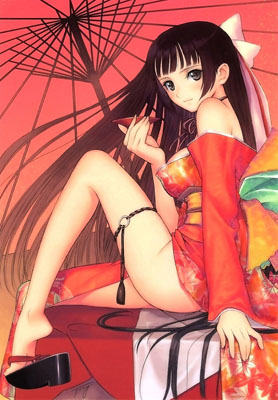
There’s nothing NSFW. Really. Okay maybe there is a little…
In Japanese, ecchi is usually written in katakana as エッムbut the English letter “H” written in capital can be used interchangeably. Hentai on the other hand is nearly always written in kanji as 変態.
Among the English anime fandom, the general interpretation is that “Ecchi” refers to things that contain lewd or sexual behaviour that excludes sexual intercourse while “Hentai” refers to the inclusion of sex and the graphic depiction of it. Some also see it as “softcore vs. hardcore”. For example, a show like the Green Green TV series or even Love Hina would be considered to be “Ecchi” (by varying degrees), while shows like Cool Devices and Bible Black are classified as “Hentai”.
(Please, for the love of Haruhi, don’t google for those names)
The definition described above is restricted to English. Those are what “Ecchi” and “Hentai” mean in English (or rather the branch of English used by anime fans). Japanese has different uses for those two words.
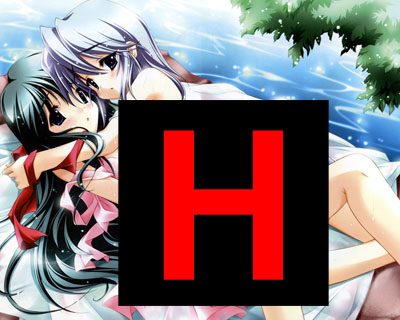
In Japanese, 変態 (hentai) and エッム(ecchi) are worlds apart. In general, pornographic materials are referred to as “ecchi” or “H”, although “ero” (supposedly more subtle than “ecchi“) seems to be preferred for certain things like games and manga nowadays. You don’t go into a Japanese video store asking for “Hentai anime”, instead you ask for “H-anime” (if you dare to ask for it at all that is).
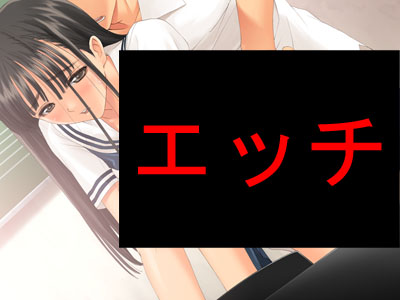
Ecchi not only means lewd or dirty, it in fact refers to the act of sexual intercourse itself, something that is specifically excluded from its English definition. In fact, the sentence “ecchi shiyou ze” or “H shiyou ze” in Japanese would mean “Let’s have sex”. (Please don’t try to use it on strangers IRL kthx)
Therefore, in Japan, ALL porn videos (animated or not) are considered H-videos (or just AV) and there’s no such thing as “Hentai videos” or “Hentai anime”.
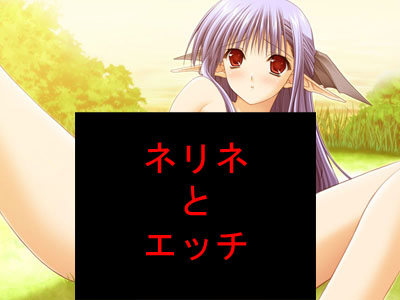
So where does hentai come in? Well… it doesn’t, actually. While dictionaries and historians generally agree that this usage of the letter “H”, subsequently “ecchi“, was derived from the word “hentai” some time in the last century, the two words are pretty much unrelated in modern Japanese.
Hentai, when used in a sexual context, means “pervert”. Not the “oh, you’re such a pervert! ;)” kind of pervert, but the kind of pervertness that gets you thrown into jail and admitted to mental institutions. Seriously, even an otaku buying lolicon porn in the middle of Akiba will stare at you hard if you ever try to ask for a “Hentai video”. It just conjures all sorts of weird and terrible images in the mind of a native Japanese. In fact, it’s probably more common to see 変態 (hentai) used for its scientific definition, which is “metamorphosis” (i.e. caterpillar to butterfly).
Ecchi on the other hand is a slang used to refer to porn, sex and anything related to sex in general.
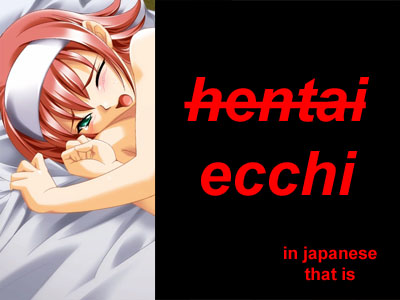
In fact, most Japanese do not even know that “H” came from “Hentai”. They are THAT different. So please, for the love of Haruhi, do not refer to porn anime as “Hentai” when you are in Japan! You might just get into trouble with the police! I speak NOT from personal experience! Really!
That said, it’s perfectly legitimate to use “Hentai” as such in English. The English language has been assimilating words for its own evil purposes for hundreds of years. For example, the word “pork” came from the French word “porc” for pig, yet we use “pork” to refer specifically to pig meat. There’s nothing wrong with it as long as we don’t confuse it with the original language.

Feena is the win
Another example: The term 少女愛 (shoujo ai) does exist in Japanese, but it’s used more often as a synonym for lolicon (“feelings of love towards young girls”) than for Girls’ Love (“lesbianism”). I kid you not. The first page of results on google for 少女愛 gives you nothing but lolicon-related articles. In English, we use it only for the latter meaning.
And by the way, the word “rorikon” in Japanese is a synonym of å°å…性愛 (“paedophile”). You often see it used in newspaper reports on child porn criminal cases. This is again different from the English usage of “lolicon”, where it is implied (and necessary) that the material in question is drawn and not real.
It’s interesting to see how English adapts foreign words to fulfil more specific purposes. 刀 (katana) really just means “sword”, but since we already have the word “sword” in English, we use “katana” to refer only to Japanese swords. Similarly, ãƒãƒªã‚³ãƒ³ (rorikon) is really just a synonym of “paedophile”, but since we already have the word “paedophile” in English, we use “lolicon” to refer to drawn girls and not real girls.
Interestingly, as a side effect of this, the Japanese and English wikipedia articles on lolicon are actually talking about completely different things, which is why the English version starts off with the emphasis “in the western world”.
Well, hope you enjoyed this little post. I talk too much.

H. Get it? Ahahaha. Okay fine it’s a lame joke.

Nicely written post, and thanks for clearing that up. I try to be aware of both definitions for such loanwords, but it can be hard to find accurate info. ^^;
That sir, was a fine lesson.
Good post. But one bigger question looms. You view dirty pictures?? Shame on you.
Agreed
He doesnt view them, he plays them.
Ah…this typical debate…
Every person has his or her urges. Different people use different methods of relieving them. That is all. ;)
You just trying to get more google page links with this post! Lmao.
“So please, for the love of Haruhi, do not refer to porn anime as “Hentai” when you are in Japan!”
If anyone is visiting Japan and have to still have to get porn anime, it’s a bit sad yo. Please teach everyone the art of picking up japanese girls! With lines like ecchi shiyou ze
My plan has been foiled!
Anyway, there’s nothing wrong with buying porn when you are in Japan! Especially porn you can’t get at home. As long as you can get it past the custom officers. ^_^
While sourcing for images for this entry, I was horrified by the complete LACK of Feena pictures everywhere! :( Maybe it’ll get better once Yoake mae yori Ruri-iro na airs…
P.S. tj han faps to figurines!
heh… well, at least i have something to quote if anyone ever asks about such things…. though… if someone did ask… i’d prolly freak out first… especially on the lolicon one… lol
it is kinda funny to find out what english words were originally based on meant… makes for some interesting decisions on whether or not to actually use it in a conversation XD
In anime dialogue, ‘hentai’ seems to be used a lot for example when a girl is accusing a guy of being perverted or something (usually she’s in reactionary tsuntsun mode at the time ;)).
Is this an exaggeration by using the wrong word on the accusers part (much as we often do in English), or is that word usage often correct?
I’m having trouble thinking of specific examples… but i seem to remember Chidori Kaname likes to use this word a lot.
Ah, yes they do use it in such a way. It’s not wrong, but there’s a slight difference from English.
For example, a panties thief is a “pervert”. A Japanese would call him “hentai“.
On the other hand, a girl can tease her boyfriend by calling him a “pervert”. In this sense, it’s probably a lot closer to the Japanese word “sukebe” or “ecchi“.
Simply put, hentai is pervert and ecchi is sex/sexual/horny. “Ecchi” is considered “normal” (horny teenagers and porn videos are normal) while “hentai” is considered “abnormal” (serial rapists are abnormal. I hope).
So yeah, being called a “hentai” is quite serious, more so than the word “pervert” in English.
Very interesting explanation. Thanks.
Nice article on the difference ecchi and hentai. Usually I would just refer to an “hentai game” as simply just an H-game. I do so just because H…first letter…yeah. Well hopefully that real life experience you were talking about wasn’t that serious. I’ve learned a lot today from DarkMirage-sensei. Please teach us more in the future =D
Omg~ SO… Shoujo Ai is actually lolicon in some ways? Now what happened to the topic about Shoujo Ai and Shounen Ai a few weeks back.
Anyway, I love Feena so much! Time to get a new figurine of her!
Also, hen in Japanese is an adjective that means strange. I hear this fairly often vs. hentai
変 [ã¸ã‚“] (adj-na,n) change, incident, disturbance, strange, flat (music), odd, peculiar, suspicious-looking, queer, eccentric, funny, (P)
go go dm for laying out the 411.
I think from a translational perspective it’s moot to explain their connotation and use in such a way that they parallel. You might as well learn Japanese. But it’s good to be mindful that english and japanese words just mean different things now.
I knew about the main distinction between the ecchi and hentai, but not the specifics, which is good to know. I am pretty surprised about shoujo-ai though. But could you have explained the difference between that and yuri to? :3
omo: yup, I use “Hentai” when I am speaking in English too. It’s what English is about: butchering foreign words to enlarge its own vocabulary. :P It’s fine as long as the speaker knows the difference.
TheBigN: Well, “yuri” is what they have always been using. That and “Girls’ Love”.
“Shoujo ai” being used for yuri is a relatively recent thing. Some doujinshi artists used it and it’s sort of accepted now. There certainly isn’t the “softcore vs. hardcore” difference that seems to be common in English, i.e. Shoujo Ai = pure; Yuri = with sex.
It’s the same thing with shounen ai. It does exist as a word in Japanese, but it is never used to describe anime or manga. In fact, a recent H-OVA declared itself as the world’s first “shounen ai” anime, but obviously it’s not the first yaoi anime. You can see that “shounen ai” was never used to describe yaoi in anime and manga.
It’s amusing that the most common term for yaoi in Japan is probably “Boys’ Love” when the English fans insist on using “Shounen Ai” (which I’ve not heard any Japanese use before).
I guess words of foreign origin = cooler no matter the language? XD
Thank you for this rather enlightening article. I didn’t know that shoujo-ai means lolicon.
For the sake of anyone interested, there’s also this interesting article about the “crazy gaijin”
http://web.archive.org/we…~kagamix2/H_does_not_mean_hentai/
By the way, DarkMirage, do you mind giving tuition for japanese? I don’t mind paying…
While I did know this, I spent many years under the incorrect impression. Thank for helping to spread the word.
You’re correct that subtle differences in meaning after a word is adopted from another language is a natural progression that shouldn’t be considered wrong (it irks me, but it isn’t wrong), but I tend to think that, when it is used to refer to something specific from the culture the word came from, the adopting culture should be responsible in using it with the intent of the original meaning.
Contrasting your example of using “pork” to mean “pig meat”: In that case, we’re referring to general objects. It happens. But the English-language fans of anime and manga adopted certain Japanese terms to refer specifically to Japanese productions or concepts, and as such I think we need to preserve the original meaning. After all, you’re having to warn people to not use 変態 when they mean エッãƒ, so the concept that they’re using Japanese terms clearly exists.
Sorry to bother you again, but what’s the meaning of “nerine” in the “nerine to ecchi”?
When I am looking at the pictures, the phrase “ecchi na no ikenai to omoimasu” comes to mind.
Mac: I’m only warning them not to use 変態 for エッムif they are speaking in Japanese.
I mean it’s the same thing with “anime”. It really just means cartoon in Japanese. Even Batman is anime in Japan. But we, as English speakers, want a specific word to refer to Japanese cartoons, it’s only natural that we end up adapting their word for cartoons.
The pork example is really the same thing. English already had its Germanic words for pigs, cows and deer. If I’m not wrong (I suck at ancient history), England was at one time ruled by the French noblemen. The farmers were Englishmen who reared the animals, but only French nobles got to eat the meat. So we end up using words derived from French (latin roots?) for the name of the meat (pork, beef, venison) and Germanic words for the animals. English changed by adapting French words, but that doesn’t mean French has to change at the same time too.
exalt dragon: Nerine is her name. :P Well the whole thing means “ecchi with Nerine”.
Oh, I see…..sorry to disturb you again but should I assume you don’t want to give tuition?
>_> Well… I probably won’t have the time for it any time soon.
Okkk then, thank you.
Sorry to be a bother and take up comments.
laughed hard at the nerine to ecchi pic
DarkMirage: My point is that instead of using it as a “loan word” and creating a new English word, they’re using a foreign word in English due to context.
It’s not uncommon at all. Instead of saying “snails cooked in the traditional French manner”, one generally says “escargot”. By using the French word, it establishes the context (or at least agrees with the context). Escargot simply means snails, but by using the foreign word we imply a few things.
We do the same thing with words like “anime” and “manga”. They mean the exact same thing, but when we use them in English, we imply that it’s specifically Japanese cartoons or comics.
I think that’s an important difference that lets us, as speakers of the language, nitpick. :)
Taking it more seriously, though, we’re responsible for encouraging correct usage. It still being used only by fringe groups–our groups–it isn’t so extensively adopted it can’t be corrected. Future use can be corrected! It’s our civic duty to preserve lingual integrity, reduce confusion, and prevent Japanese fans from thinking we’re idiots.
Everybody borrows. Even the French!
Well it’s the same thing with Japanese really. For example スマート (suma-to), which is really “smart”, means thin or stylish in Japanese. It cannot be used for “clever” at all. You can’t really do anything about it.
exalt dragon: If you’re studying for JLPT 2 or equivalent / lower I wouldn’t mind giving lessons… ltanATEepicentrixDOTEnet
I forget that animes such as Kimi ga Nozomu Eien and Shuffle! were originally H-games. It surprised me at first to see those two familiar faces in your pictures above. This entry was very educational, though. Thank you very much for it. Does hentai, by any chance, have anything to do with the words “hen” and “tai?” I’m not sure what the Kanji reads, but doesn’t “hen” mean weird, and “tai” mean want? So.. a want of weirdness?
Actually… no. æ…‹ (tai) doesn’t mean “want”, you are thinking of the -tai form for verbs. They just sound the same.
変 (hen) = weird
æ…‹ (tai) = the state/appearance (of something)
So literally, hentai is the state of being weird.
thanks :]
Yup, look up the definition for the English word “pervert” –
So “hentai” does work with its literal meaning of (as DM puts it), “the state of being weird”.
It’s just like how words such as “abunai!”, which literally means “danger”, is used to say “look out!”
I never realised the term Anime means “cartoons” to the Japanese when I started out in the language until my penfriend started mentioning other shows as Anime like Southpark. Then I thought, “Oh wait… Anime means general animation!”
And I agree with Omo about how every language borrows words. Checkout all the 外æ¥èªž in Japanese including how they twisted words such as 勉強 and 大丈夫. Makes me wonder what the JP scholars were doing when they went to China to learn about the culture and language.
So er, who can tell me what’s with the Japanese and their obsession with young girls and those… scenes? It’s not real but, I still think it affects you in some ways =P
勉強 in Chinese actually means “coerced to (do something)” instead of “studying” [well aren’t we all coerced to study…] and 大丈夫 actually refers to a male status-based sort of pride (think “I am a proud, and valiant dude full of manhood!!!111Oneoneeleven1!”), not sure how to explain it, but it sure DOESN’T mean “are you all right” as in daijobu desu. Just a comment – hope no rotten eggs fly this way.
When I read this article, it really gives me wtf !!!???
WHY so
You said
“Hentai, when used in a sexual context, means “pervertâ€. Not the “oh, you’re such a pervert! ;)†kind of pervert, but the kind of pervertness that gets you thrown into jail and admitted to mental institutions.”
When internet is not in browser form and the artist are still using airbrush instead of photoshop or other programs, those Japaense artists themselves labeled their works as hentai 変態 for stuff that have nudity and sex. Are you telling me they are not in their right mind for so doing????
You said
“Ecchi not only means lewd or dirty, it in fact refers to the act of sexual intercourse itself”
Let me ask you a Qn, if a gal points at you and said Ecchi, what do you think she is doing or wanting???
That’s very nice, but I don’t see your points.
May I refer you to the Wikipedia articles for hentai, hentai seiyoku and ecchi. I am too lazy to explain this again.
Wow I had questions about hentai and they were answered in your posts.U are truly incredible….. Anyway the article was truly enlightening and u did not talk too much u were quite precise…..
wow good… it’s very nice….. i wonder why you nvr teach japanese aboard lolz
i think you should sticky your article in wikipedia?
or you derive from there?
imo ecchi cannot be found in the dictionary but its meant for softcore per se
as many decent anime like mai hime in animeyume.org is classified under ecchi category which doesn’t have any nude scenes or they cover nude scenes per se.
ecchi = sex in what sense? cuz usually sex is more of a hentai attitude than ecchi. probably ecchi is somebody like in School Rumble the golden hair boy. that kind of behaviour. but really perverted all out to rape.
something like tona gura.
thanks for this distinction of ecchi and hentai. and thanks for reminding the use of H in japan.
Nice work!!
I´ll have to remember this entry so I can send all persons who doesn´t understand the differences between ecchi and hentai here so they can read it from a second source.
Ecchi = sex, hitori ecchi = masturbation (self sex).
Hentai is a rough word, princess69, depravity (å •è½ å¥³æ•™å¸«ç ´å£Š), Night Shift Nurses and tentacle animes are examples of ‘hentai’ cartoons.
Another thing is that ‘Age of consent for sexual activity’ in Japan is 13 (or higher in some jurisdictions, eg. Tokyo 16). English person would call pedophilic some of the things that Japanese consider normal. Rorikon (lolicon) for us is not the same as rorikon for Japanese.
‘Loli-Pedo-Fin’ from ‘Shuffle” comes to mind.
Some people call themselves or other people ‘lolipedofins’ but real meaning is ‘a pedophile’. It’s not a big issue in Japan but outside of Japan it can be.
i love your picture of feena
im a huge fan of both hentai and ecchi
my favorite by far is yuri though
i love to see videos and pictures of lesbian anime girls kissing, raping, licking, sexing, and doing sexual acts together. if you want to see alot of yuri than go to
http://www.lestai.com
thanxxxxxxxxxxx
Wow man.
That was very informative!
Now I can shut those idiots’ mouths who think they know everything lolol
You borrowed the word paedophile from german btw :P
Though it’s quite funny that you still have the “ae” which is read as ä in german. Therefore the englisch paedophile and the german pädophiel (no, I didn’t mix up the letters) are nearly the same.
(Though pädophiel is only the adjectiv, the noun is Pädophieler)
Funny article btw. Keep it up.
Pingback: Anime Girl das sich verbeugt - Anime & Manga
This is a really interesting and informative article, I learned a lot of things I didn’t know of before. Hopefully I remember some of it when I go to Japan later in life.
Japanese hentai anime porn share free video clip 10:18
The stage is the private school where a horrifying ceremony used to take place in the basement 12 years ago. One day, a central hero came
Bible Black Only 1 – Imari Rape Scene
Pingback: The Ecchi fanclub - Page 6 - MangaShare